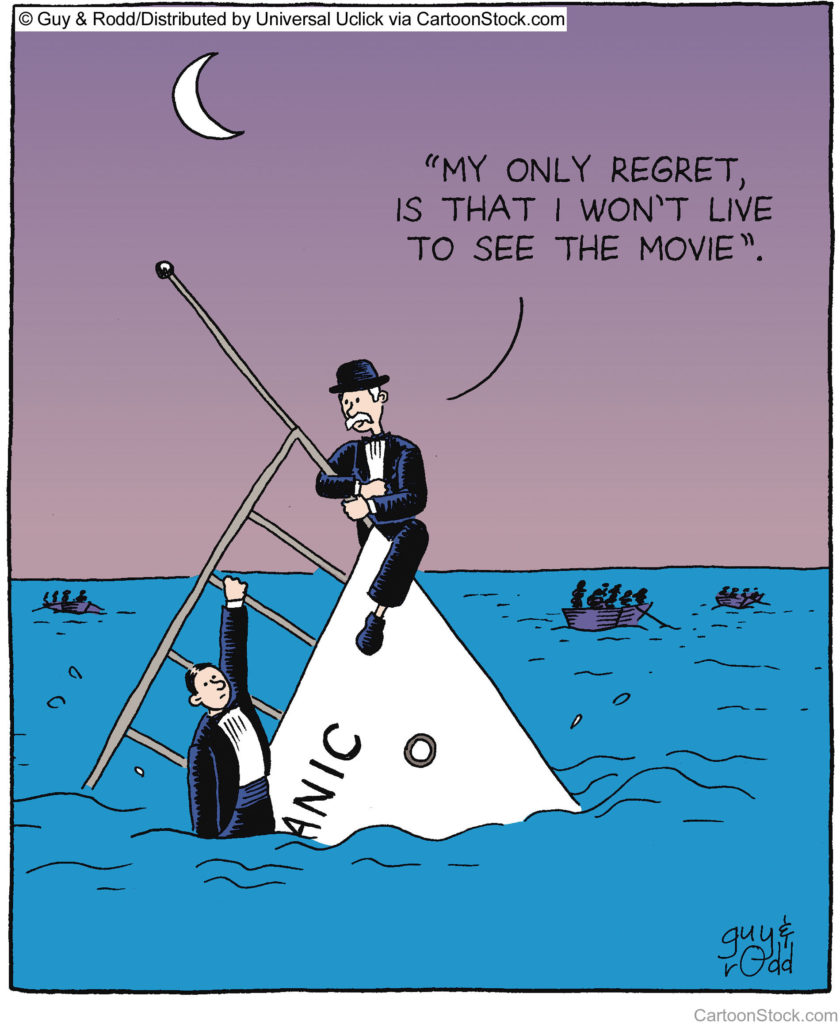 At the beginning of each new year we’re encouraged to set goals for the coming year. I’m a big fan of that. It might also be beneficial to periodically list regrets: things we regret about the previous year and even regrets from the distant past that have come into focus.
At the beginning of each new year we’re encouraged to set goals for the coming year. I’m a big fan of that. It might also be beneficial to periodically list regrets: things we regret about the previous year and even regrets from the distant past that have come into focus.
Here’s my truncated list of regrets from the past.
- Not learning a second language. In high school I studied Spanish for three years; to get my PhD I learned German, but neither language “took”; I viewed both pursuits as “got to” instead of “get to.” My four-year-old grandson, Benjamin, attends a Spanish immersion school where only Spanish is spoken. I hope he keeps it up.
- All three of my college degrees are in music. I should have pursued a broader education.
- I didn’t understand until later in life, the impact my dysfunctional family had on my life.
- I didn’t understand the value of reading books until later in life. For the first 55 years of my life I only read books under compulsion. I didn’t understand that “reading allows us the benefit and pleasure of thinking another person’s thoughts” (Harris).
- I didn’t drink wine until I was 40 years old. My conservative, Protestant upbringing taught that drinking wine is sin. It isn’t. (I need to write a blog post on this topic.)
- I haven’t loved my wife as I should.
- I didn’t understand the joy and wonder of “prefer one another.” For most of my life I have focused on me—my interests and well-being. Two thousand years ago the apostle Paul encouraged us to focus on others (Philippians 2:4). Adam Grant recently wrote a book on the topic—Give and Take.
…and the list goes on
Some regrets are fixed and the loss unrecoverable. Name them and learn from them, but then drop them—there’s no value in crying over spilt milk. But most of our regrets can be minimized through change. In a wonderful, redemptive manner, naming a regret and then vowing to make things different, works. Of the seven regrets I listed above, none are immutable.
The word “regret” normally carries a negative, fatalistic meaning. Why not reimagine the term to mean “catalyst for course correction”?
[reminder]What are your thoughts about this essay?[/reminder]

I appreciate this article. I make a list of goals (not resolutions) every January. Unfortunately, I don’t always meet the goals, but making the list helps to move me forward and keep from getting “stuck.” I’ve not made a list of regrets, but it definitely formulates in my mind from time to time. Perhaps I should give that one more attention. Thanks, Don.
Rhonda,
Well done–you’re yearly list of goals. “If you aim at nothing, you’ll always hit it” is very true. Have a good new year.
I appreciate your candor and pointing out the value of reflecting on and learning from issues of the past. This is something we probably intellectually know but need to be reminded to do. Then the hard part for me —- putting them back on the shelf
Thanks
I agree, Bill. We can learn a lot by reflecting on the past, but it’s counterproductive to spend too much time there.
Good stuff. Sometimes I cringe at past failures. I am learning from counseling that I have been way too hard on myself. My regrets were, basically, self condemnation. Catalyst for chsnge. That’s much better!
Kirby, having a personal counselor is a wonderful thing. I enjoy visiting with mine. Self-condemnation is a subtle thing to deal with. Have a good 2019.
I believe regrets stem from core spiritual weakness (you could call them “sins”, but then we simply dismiss them under Grace). When we look personally beneath the surface I think the Holy Spirit begins to revisit our past wounds to ourselves and others. Only then, if we truly regret in mind, will and emotion, does He supply us the power to permanently heal, change start to know God’s love for us (me!) and grow in grace. But, I could be wrong about that….
Jim,
Thanks for taking the time to write. I wouldn’t associate regrets with sin; sometimes regrets arise because we simply made an unfortunate decision, or perhaps someone made a decision for us that was out of our control. Have a good new year.
Thanks for sharing this idea, Don. In doing so, I would highlight that you end up fulfilling your last bullet point, at least to some extent. By sharing your past regrets, others may learn from them and end up correcting their course in the present. In that way, you’ll have ended up serving them by ensuring they don’t end up sharing the same regrets! Thank you.
Thanks, Aaron, for kind words. I do hope I’ve improved and become less self-focused and that others can learn from my regrets. Have a good new year.
I would like to see the blog on wine.
Shirley, I’ll start writing that and post it in 2019.